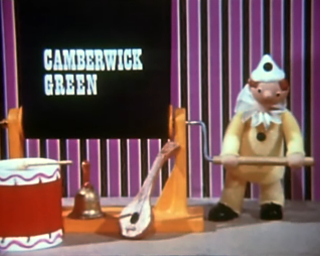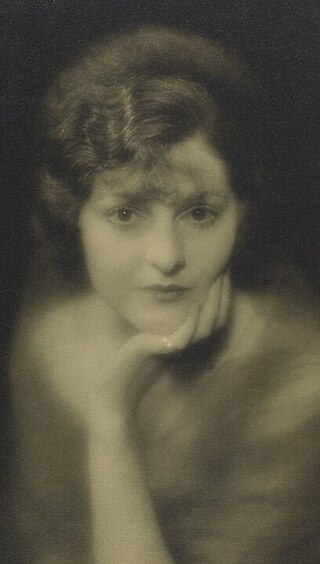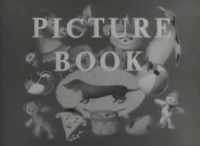
Captain Kangaroo is an American children's television series that aired weekday mornings on the American television network CBS for 29 years, from 1955 to 1984, making it the longest-running nationally broadcast children's television program of its day. In 1986, the American Program Service integrated some newly produced segments into reruns of past episodes, distributing the newer version of the series to PBS and independent public stations until 1993.

Camberwick Green is a British children's television series that ran from January to March 1966 on BBC1, featuring stop motion puppets. Camberwick Green is the first in the Trumptonshire trilogy, which also includes Trumpton and Chigley.
The Story Makers is an educational children's television programme that was broadcast on the BBC's pre-school digital television network, CBeebies as well as being one of the launch programmes for the channel. The Story Makers is set in a children's library, and encourages literacy and creativity.

The Wubbulous World of Dr. Seuss is an American children's puppet television series based on characters created by Dr. Seuss, produced by The Jim Henson Company. It aired from October 13, 1996, to December 28, 1998, on Nickelodeon. It combines live puppets with digitally animated backgrounds, and in its first season, refashioning characters and themes from the original Dr. Seuss books into new stories that often retained much of the flavor of Dr. Seuss' own works.

Andy Pandy is a British children's television series that aired on BBC Television in 1950. Originally live, a series of 26 filmed programmes was shown until 1970, when a new series of 13 episodes was made. This series was based upon a comic strip of the same name.

Eleanor Audley was an American actress with a distinctive voice and a diverse body of work. She played Oliver Douglas's mother, Eunice Douglas, on the CBS sitcom Green Acres (1965–1969), and provided Disney animated features with the voices of the two villain characters, Lady Tremaine, Cinderella’s cruel stepmother in Cinderella (1950), and Maleficent, the wicked fairy in Sleeping Beauty (1959). She had roles in live-action films, but was most active in radio programs such as My Favorite Husband as Liz Cooper's mother-in-law, Mrs. Cooper, and Father Knows Best as the Anderson family's neighbor, Mrs. Smith. Audley's television appearances include those in I Love Lucy, The Dick Van Dyke Show, Mister Ed, Hazel, The Beverly Hillbillies, Pistols 'n' Petticoats and My Three Sons.

Watch with Mother was a cycle of children's programmes created by Freda Lingstrom and Maria Bird. Broadcast by BBC Television from 1952 until 1975, it was the first BBC television series aimed specifically at pre-school children, a development of BBC radio's equivalent Listen with Mother, which had begun two years earlier. In accordance with its intended target audience of pre-school children viewing with their mothers, Watch with Mother was initially broadcast between 3:45 pm and 4:00 pm, post-afternoon nap and before the older children came home from school.
Something Special is a British children's television programme presented by Justin Fletcher. It was created and co-directed by Allan Johnston. It is broadcast by the BBC, debuting on 1 September 2003. It is designed to introduce children to Makaton signing, and is specifically aimed at children with delayed learning and communication difficulties. It is aired on the CBeebies channel and is currently the longest running CBeebies programme and the longest running preschool series in Britain. In the past, it was also broadcast as part of the CBeebies programme strand on BBC One and BBC Two.

Picture Book is a BBC children's TV series created by Freda Lingstrom, first broadcast in 1955. It was the Monday programme in the Watch with Mother cycle. Initially introduced by Patricia Driscoll, the programme encouraged children to make things; Driscoll's catch phrase was "Do you think you could do this? – I am sure you could if you tried". She left the programme in 1957 to play the part of Maid Marian in the ITV series The Adventures of Robin Hood. Patricia Driscoll's episodes were repeated until 1963 when they were replaced by a new series of episodes with Vera McKechnie. The programme ran until December 1965 and replaced in the Monday slot by Camberwick Green in January 1966.
"There Was an Old Lady Who Swallowed a Fly" is a children's rhyme and nonsense song of a kind known as cumulative.
Freda Violet Lingstrom OBE was a BBC Television producer and executive, responsible for pioneering children's programmes in the early 1950s. She and her friend Maria Bird together created Andy Pandy and The Flower Pot Men.
Gordon Murray was a British television producer and puppeteer. He created and wrote some of the most repeated children's television programmes ever seen in Britain. Camberwick Green, Trumpton, and Chigley, collectively known as the Trumptonshire Trilogy, were all made by the company he founded.

Marianne Stone was an English character actress. She performed in films from the early 1940s to the late 1980s, typically playing working class parts such as barmaids, secretaries and landladies. Stone appeared in nine of the Carry On films, and took part in an episode of the Carry On Laughing television series. She also had supporting roles with comedian Norman Wisdom.
Judy Flynn is a British actress. She is known for her roles as seamstress Madge Howell in the BBC drama The House of Eliott (1991–94), and as the secretary Julie in the BBC sitcom The Brittas Empire (1992–97). Her other television credits include two episodes of the Victoria Wood comedy dinnerladies (1999), and two episodes of Shameless (2012).

Mary Treen was an American film and television actress. A minor actress for much of her career, she managed to secure a plain, unassuming niche for herself in dozens of movies and television shows during the Hollywood of the 1940s, 1950s and 1960s in a career spanning more than 40 years.
Future Generations: Small People was a charity programme for Children in Need, put together by the BBC in 1998 as a sequel of sorts to the great success of the previous year's Perfect Day charity single.

Connie the Cow is a children's television series created by Josep Viciana, and designed by Roman Rybakiewicz. It was produced by Spain-based studio Neptuno Films, and it aired on TV3 in Catalonia. In the United States, it aired on Noggin.
Maria Edith Bird was a South–African born British producer.
Rhyme Time Town is an American children's animated musical streaming television series developed by DreamWorks Animation Television that reimagines classic nursery rhymes from the viewpoints of two preschoolers, Daisy the puppy and Cole the kitten. It was released on June 19, 2020 on Netflix. A 10-episode sing-a-long series titled Rhyme Time Town Singalongs was released on December 22, 2020.










